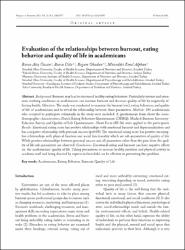Evaluation of the relationships between burnout, eating behavior and quality of life in academicans
Künye
Özcan, B. A., Uslu, B., Okudan, B., & Alphan, M. E., (2021). Evaluation of the relationships between burnout, eating behavior and quality of life in academicans. PROGRESS IN NUTRITION , vol.23, no.2.Özet
Arka plan: Tükenmişlik, sağlıklı beslenme davranışlarının azalmasına neden olabilir. Özellikle akademisyenlerde yoğun ve yorucu çalışma koşulları sağlığı olumsuz etkileyerek tükenmişliği artırabilmekte ve yaşam kalitesini düşürebilmektedir. Amaç: Araştırma akademisyenlerin tükenmişlik düzeyini, yeme davranışlarını ve yaşam kalitesini incelemek ve bu parametreler arasındaki ilişkiyi ortaya koymak amacıyla yapılmıştır. Yöntem: Araştırmaya gönüllü olarak katılmayı kabul eden 194 akademisyen dahil edildi. Katılımcılara sosyodemografik özellikleri içeren anket formu, Hollanda Yeme Davranışları Anketi (DEBQ), Maslach Tükenmişlik Envanteri-Eğitimci Anketi ve Yaşam Kalitesi Anketi-Kısa Form (SF-36) uygulandı. Bulgular: Duygusal yeme puanının duygusal tükenmişlik ve duyarsızlaşma ile pozitif, kişisel başarı ile negatif ilişkisi vardır (p >= 0.05). Duygusal yeme puanının yaşam kalitesinin alt parametreleri olan fiziksel fonksiyon ve sosyal işlevsellik ile pozitif yönde anlamsız ilişkileri vardır. Kişisel başarı ile yaşam kalitesi alt parametrelerinden ağrı dışındaki tüm parametreler arasında pozitif ilişkiler gözlenmektedir. Sonuç: Duygusal yeme ve tükenmişliğin akademisyenlerin yaşam kalitesi üzerinde olumsuz etkileri olabilir. Akademik kadroda sağlıklı beslenme ve fiziksel aktiviteyi artırmaya yönelik tedbirlerin alınması ve alanında uzman kişilerin yönlendirilmesi bu sorunun önlenmesinde etkili olabilir. Background: Burnout may lead to decreased healthy eating behaviors. Particularly intense and strenuous working conditions in academicians can increase burnout and decrease quality of life by negatively affecting health. Objectives: The study was conducted to examine the burnout level, eating behaviors, and quality of life of academicians and to reveal the relationship between these parameters. Methods: 194 academicians who accepted to participate voluntarily in the study were included. A questionnaire form about the sociodemographic characteristics, Dutch Eating Behaviors Questionnaire (DEBQ), Maslach Burnout Inventory-Educator Survey, and Quality of Life Questionnaire -Short Form (SF-36) were applied to the participants. Results: Emotional eating score has positive relationships with emotional burnout and depersonalization and has a negative relationship with personal success (p >= 0.05). The emotional eating score has positive meaningless relationships with physical function and social functionality which are sub-parameters of quality of life. While positive relationships between personal success and all parameters other than the pain from the quality of life sub-parameters are observed. Conclusions: Emotional eating and burnout can have negative effects on the academicians' quality of life. Taking precautions to increase healthy nutrition and physical activity in academic staff and being directed by experts in their field can be effective in preventing this problem.

















